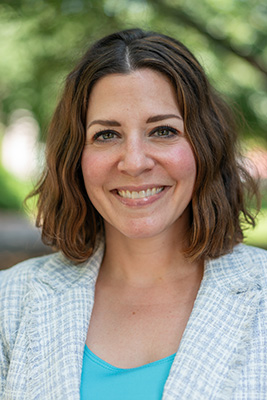Faculty Profile
Emily Kelahan
Assistant Professor of Philosophy (2024)Contact Information
East College
717-245-1002
Bio
Emily's research and teaching interests lie in roughly two areas: the history of early modern philosophy (1550-1800) and the philosophy of work (what is work? how is it different from play, leisure, labor, and other related concepts? what is the place of it in a flourishing human life?). What both of these areas have in common is that they allow her to engage in a variety of sub-disciplines at once. She likes to pose and attempt to answer tough questions that lie at the intersection of epistemology, metaphysics, ethics, and social philosophy. She loves philosophy, period, and she tends to pursue projects and teach classes that are interdisciplinary and connected to the lived human experience both in and outside the classroom. Indeed, she regards herself as a field philosopher, which means that she believes philosophy has something valuable to offer people in the daily conduct of their professional and personal lives and she likes to be the one to help them see it. You can do philosophy with Emily in several courses at Dickinson (17th & 18th Century Philosophy, Philosophy of Work, Philosophy of Data, Practical Ethics, and Philosophy of Religion to name a few) and in a variety of professional contexts across disciplines and industries. If you want to talk field philosophy, send her an email.
Education
- B.A., Illinois Wesleyan University, 2005
- M.A., University of North Carolina at Chapel Hill, 2007
- Ph.D., 2011
2025-2026 Academic Year
Fall 2025
PHIL 251 Philosophy of Religion
This course focuses on philosophical issues arising from religious belief and practice. Topics treated may include: the existence and nature of god or gods; the contested relation of a god to moral values; faith and reason as sources of belief or ways of believing, as expressed in classic texts by thinkers such as Aquinas, Hume, Kierkegaard, and William James, as well as in contemporary texts.
PHIL 261 Philosophy of Work
Philosophy of Work Yard work. Housework. Working out. Working it. Work seems to be much more than performing a job for compensation. Work is central to our modern lives, but what exactly is it? What's its value? Under what conditions is it performed, by whom, and are those conditions acceptable? What are the various working relationships in which we find ourselves and what do we owe to whom? How is it different from play and leisure? Is there too much work? Is there enough? Who gets to work? Who has to work? What is the proper place of work in a human life? Philosophy of Work will guide students through a variety of answers to these questions and will hone their ability to develop their own positions through consideration of normative case studies (e.g., mouse jigglers and mouse jiggler surveillance, intellectual property litigation, FTC banning noncompetes, paying student athletes, etc.)
Spring 2026
PHIL 113 Prepared for a Life of Meaning
Cross-listed with INBM 190-01. This course was inspired by a course taught by Ernie Parizeau, a retired entrepreneur who decided to help liberal arts graduates think about planning their lives as they get ready to leave college. This course aims to leverage your liberal arts education and to help you prepare for a meaningful life by exploring critical aspects of your post-college plans, and by practicing essential life and work skills. We will learn key concepts by reading and discussing literature in philosophy, psychology, education, leadership, and sociology. You will tackle assignments designed to develop skills and cultivate sound judgment, equipping you with tools to navigate life after graduation. We will discuss the seemingly small things (writing thank you notes, financial budgeting and fixing a tire) and larger issues (directing your professional life, pursuing fulfilling activities, establishing lifelong friendships). We will have several guests-people who created nonprofits, who ran public companies, and who took different paths to find fulfillment. Importantly, we will have guests who took risks, made mistakes and still navigated to find some sort of success. To assist in and test your post-college plans, you will establish a personalized Board of Advisors to support you in making life decisions and overcoming life's challenges. You will leave the course with a toolkit to help you tackle the ambiguities of life.
INBM 190 Prepared for a Life of Meaning
Cross-listed with PHIL 113-02.
DATA 198 Philosophy of Data
Cross-listed with PHIL 258-01.
PHIL 202 17th & 18th Century Philosophy
This course treats the Rationalists, Empiricists and Kant, with particular emphasis on issues in epistemology and metaphysics, such as the possibility and limits of human knowledge, the role of sense perception and reason in knowledge, the nature of substance, God and reality.
PHIL 258 Philosophy of Data
Cross-listed with DATA 198-01.
